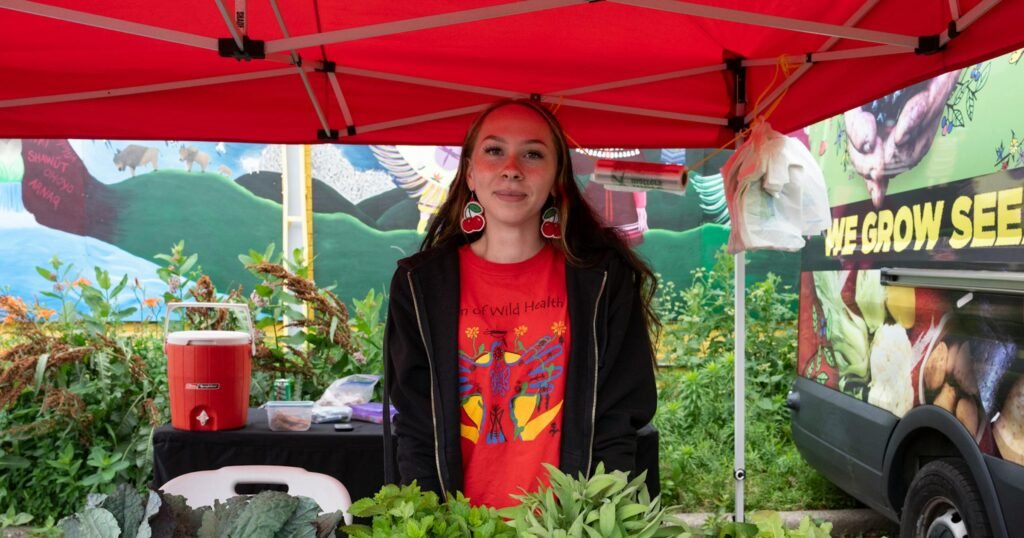For Destiny Jones, Indigenous-owned farmers markets are key to preserving cultural traditions, especially in cities that can sometimes be hostile and isolating for communities, she says.
“It’s really fun when you come to the market and see all the people you know coming together to browse and meet each other,” Jones said.
She runs the Four Sisters Farmers Market in Minneapolis’ East Phillips neighborhood, which aims to preserve Native American traditions by having Native American merchants sell goods such as traditional pine cone jelly, jewelry, and fresh fruits and vegetables.
While the market is targeted to Indigenous people, Jones hopes it will also serve as an educational opportunity for others.
“When working in an Indigenous space, some people may already know what Ojibway art is like compared to Dakota art,” Jones says, “so vendors should be prepared to answer those questions and facilitate the conversation.”
Four Sisters is one of several local farmers markets owned or operated by Indigenous people and people of color, and its BIPOC owners and operators say they aim to create a safe space where people can connect with one another and share cultural experiences.
“Even if they weren’t participating in the market events, people still wanted to see each other, say hello and really interact,” said Moe Hanson, director of the Midtown Farmers Market.
Founded by the Corcoran Neighborhood Organization, Midtown Market wants to make food more accessible to local residents, Hanson said. The market is located near the Lake Street/Midtown light rail station in Minneapolis, increasing awareness and accessibility in high-poverty areas. “We need spaces with alternative pricing and commerce methods,” Hanson said.
Hanson said a people-centered approach to food access is a key part of the market’s philosophy, which encourages customers to interact with vendors and their neighbors.
“We invite people to come in, take a break, relax and share the space with their neighbors,” Hanson said. “That’s something you don’t get in a purely commercial establishment.”
The market serves as a space for people who don’t feel comfortable going to a grocery store because of accessibility issues or other reasons, she said.
“We’re really filling a space for people who have sensory needs that can’t be met in the big box stores,” Hanson said. “We’re trying to meet every need that we can for members of our community, because food is what we need to survive.”
One of the ways the market gets food is through the Supplemental Nutrition Assistance Program Electronic Benefit Transfer (SNAP EBT) matching program. The market provides financial assistance for people to buy food, said Macy-Chau Tran, program and communications director for Midtown Farmers Market. For example, when someone spends $10 of their SNAP EBT benefit at the market, they’re given $20 toward an additional purchase at the market.
The SNAP program, also known as food stamps, is run by the U.S. Department of Agriculture and gives low-income people debit cards preloaded with funds to buy nutritious food. Tran said the Midtown Farmers Market was the first in Minnesota to accept SNAP EBT in 2006.
Hanson said the Midtown market vets vendors based on their needs and motivations. “We, like many markets, want a balanced space with a variety of options,” she said.
The Four Sisters Farmers Market was founded in 2014 by the Native American Community Development Association to educate residents about indigenous communities.
“We make space for early stage entrepreneurs to get their businesses off the ground by securing a space in the market and helping them connect with resources that will help them grow their business,” Jones said.
Devon Nolen runs People’s Market, a Black-owned market in north Minneapolis that opened for its second season on June 22. Nolen said her previous job working as a food justice consultant with the Northside Fresh Coalition helped her understand issues surrounding food insecurity on the Northside, including the lack of access to grocery stores after Walgreens and Aldi closed stores last year and Walmart closed its store near Brooklyn Center.
“This is structural and institutional racism,” Nolen said. “There’s a long history of divestment and departure in north Minneapolis. It’s not because these stores weren’t profitable, it’s not because there was too much theft. Gentrification is already happening. Food markets and schools are falling apart, the community values are gone, and businesses are moving out.”
After losing three stores, Nolen felt a need to feed the people in her community, so she founded People’s Market, which she hopes will rewrite people’s perceptions of the black community.
“My goal has always been to serve the invisible because there is so much classism and elitism in our city and I am a victim of that,” Nolen said. “There really isn’t a place in Minneapolis that celebrates our culture.”
About the Partnership
This story is Sahan JournalA nonprofit newsroom covering immigrant and communities of color in Minnesota. Free Newsletter Get Sahan’s stories in your inbox.

